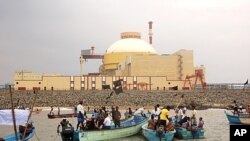India's government has revoked the visa of a Japanese anti-nuclear activist who was scheduled to visit during the one-year anniversary of the Fukushima disaster. Nuclear energy opponents say the move fits a pattern of seeking to stifle criticism of India's rapid push toward nuclear power.
India says it revoked the business visa it granted to Maya Kobayashi because her travel itinerary did not match the stated purpose of her trip on her application.
Greenpeace India, the organization that was to host her, says the real reason is more likely to be her plans to address fellow opponents of nuclear energy near the site of a controversial planned reactor in the state of Tamil Nadu.
Kobayashi lived in Fukushima when the earthquake and tsunami struck last year. She relocated due to concerns about radiation from the damaged reactor there.
Greenpeace India campaigner Karuna Raina says she and other Fukushima survivors have been visiting other major consumers of nuclear power, like South Korea, but that India is the only country to deny her a visa.
"She is not someone who is going to do anything," said Raina. "She is not a threat to our country. She was just going to come here and talk about her experiences."
Activists like Raina say the visa cancellation reflects a "shrinking democratic space" when it comes to discussing nuclear power in India. Raina says the government has found itself caught off guard by popular resistance to massive nuclear projects, particularly at Kudamkulam in Tamil Nadu, where protests have delayed the scheduled operation of a reactor.
"It is such a spontaneous struggle and I think it is, just I mean they did not expect it to be such a huge resistance from people and now that it is, they cannot, they do not know how to handle that," Raina added.
S.P. Udaykumar and his group, People's Movement Against Nuclear Energy, have taken a leading role in organizing the protests. He says ordinary Indians have serious concerns about nuclear safety.
"In a highly populated country like India, even a small incident will have a catastrophic effect on large numbers of people," said Udaykumar. "Of course, no Chernobyl or Fukushima has happened. But it does not mean they will never happen in India. If you look at the track record of our disaster management, it will speak for itself."
Udaykumar denies recent comments by Indian Prime Minister Manmohan Singh that anti-nuclear protests are driven by funds from foreign nongovernmental organizations. He says accusations like that, and the Kobayashi visa denial, fit a pattern of paranoia about the nuclear debate.
"This kind of intolerance is very un-Indian. Right now we are becoming intolerant. We are becoming suspicious of foreigners," Udaykumar added.
Former U.S. National Security Council Advisor Michael Green says Japan's post-Fukushima policies on nuclear energy are likely to have a serious impact on India and the United States.
"If the Japanese government cannot make the case for the safety and security of nuclear power, and if civil society movements or local politicians are empowered and seize the initiative, then that will do the same in other democracies, where there are questions about nuclear power and safety," said Green.
Indian officials say there is little alternative to nuclear power when it comes to fulfilling India's enormous and growing energy needs and controlling carbon fuel emissions. The country plans to generate about one-fourth of its energy with 20 nuclear reactors by 2050.
News
India Cancels Visa for Japanese Anti-Nuclear Activist
- By Kurt Achin




